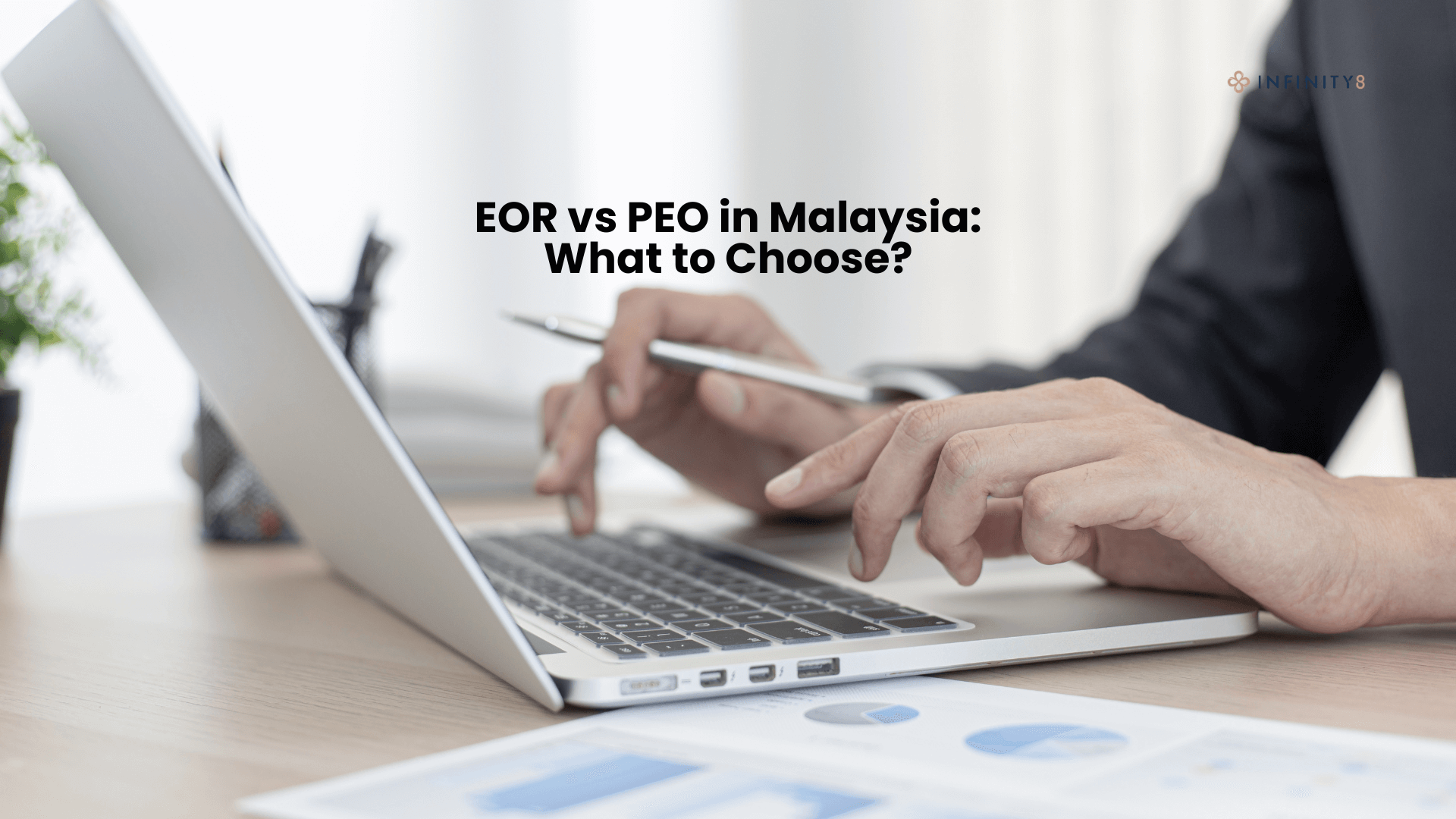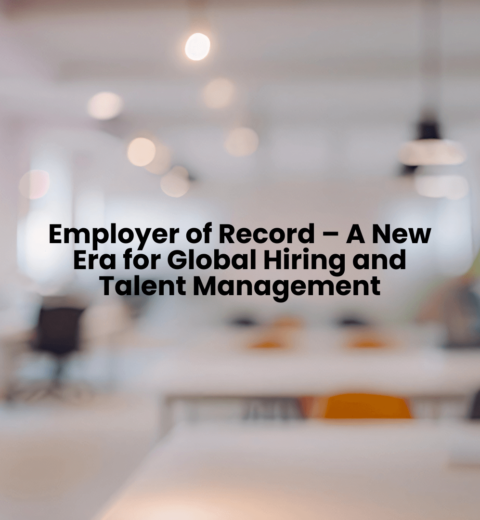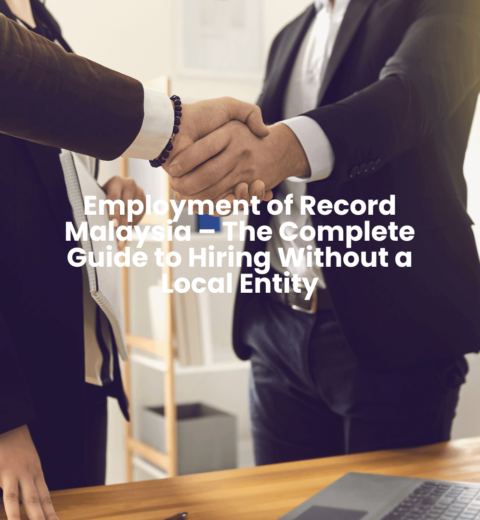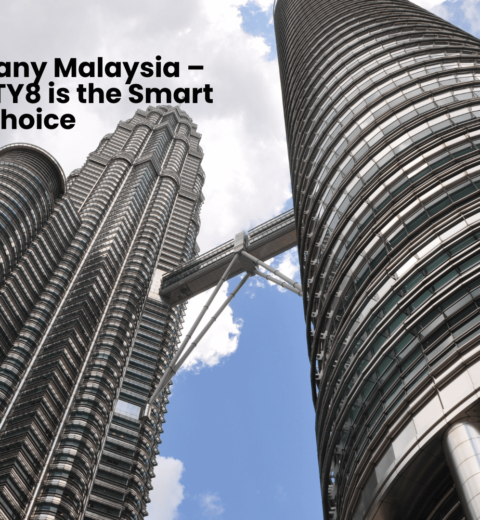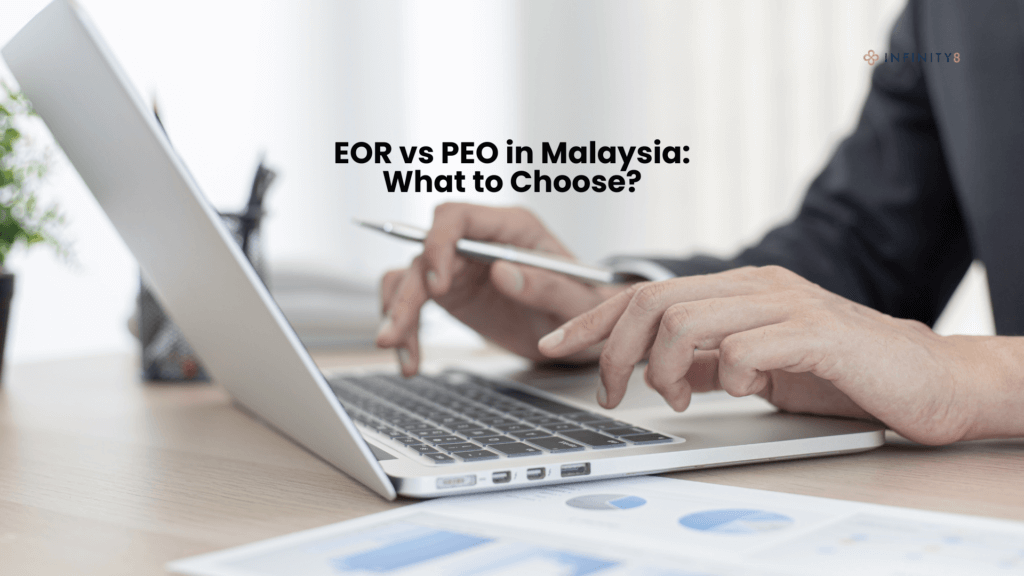
Expanding into Malaysia is an attractive option for many businesses, thanks to its strategic location, diverse workforce, and pro-business policies. But for companies looking to hire employees in Malaysia, navigating compliance with local labor laws, payroll regulations, and statutory contributions can be challenging. This is where Employer of Record (EOR) and Professional Employer Organization (PEO) models come in. Both solutions simplify HR administration, payroll, and compliance. However, they are not the same, and choosing the wrong one could lead to unnecessary costs, compliance risks, or even hiring delays. In this guide, we break down everything you need to know about EOR vs PEO in Malaysia, including:
- What each model means
- Key differences between them
- Malaysia-specific compliance considerations
- Costs and pricing structures
- Advantages and limitations
- Which solution is best for your business
What is an Employer of Record (EOR)?
An Employer of Record (EOR) is a third-party provider that legally employs workers on your behalf in Malaysia. This means the EOR is listed as the official employer in employment contracts, payroll records, and statutory filings.
Key responsibilities of an EOR in Malaysia include:
- Drafting compliant employment contracts
- Managing payroll and ensuring correct tax deductions
- Handling statutory contributions such as EPF, SOCSO, EIS, and HRDF
- Administering employee benefits (leave, insurance, allowances)
- Ensuring compliance with the Employment Act 1955 and related labor laws
- Supporting with work permit applications for foreign employees
The hiring company still manages day-to-day work, performance, and job responsibilities, but the EOR takes care of the legal and administrative employer role. Best fo crompanies that want to hire in Malaysia without setting up a local legal entity.
What is a Professional Employer Organization (PEO)?
A Professional Employer Organization (PEO) provides HR outsourcing services under a co-employment model. Unlike an EOR, the client company remains the legal employer of the staff in Malaysia.
Key responsibilities of a PEO in Malaysia include:
- Processing payroll and tax filings on behalf of the company
- Managing benefits administration
- Supporting compliance with Malaysian employment laws
- Assisting with HR functions such as recruitment or employee onboarding
However, because the client company is still the legal employer, it must:
- Own a legal entity in Malaysia
- Remain liable for compliance alongside the PEO
Best for companies that already have a registered entity in Malaysia and want to outsource
HR functions while retaining legal responsibility.
Key Differences – EOR vs PEO in Malaysia
| Feature | EOR (Employer of Record) | PEO (Professional Employer Organization) |
| Legal Employer | EOR is the legal employer in Malaysia | Client company is the legal employer |
| Entity Requirement | No entity required | Local entity required |
| Compliance Liability | Fully managed by EOR | Shared responsibility with PEO |
| Hiring Speed | Fast (days) | Slower (entity must exist first) |
| Foreign Work Permits | Supported by EOR | Usually not handled |
| Payroll & Benefits | Managed by EOR | Managed by PEO, but under client’s entity |
| Best for | Market entry, testing new market, hiring remote talent | Companies with an entity seeking HR outsourcing |
Malaysia-Specific Compliance Considerations
When hiring employees in Malaysia, employers must comply with strict statutory requirements. These include:
- Employees Provident Fund (EPF) – Retirement savings contributions (mandatory for Malaysian citizens and permanent residents).
- SOCSO (Social Security Organization) – Protection against workplace injuries and disabilities.
- EIS (Employment Insurance System) – Unemployment insurance scheme.
- HRDF Levy – Training fund contribution (for certain industries).
- Monthly Tax Deduction (PCB) – Withholding income tax obligations.
- Employment Act 1955 – Governs contracts, working hours, overtime, leave entitlements, and termination.
Non-compliance with these laws can result in fines, penalties, or business restrictions.
- EOR providers assume full responsibility for these statutory obligations.
- PEOs support administration, but your entity is still legally responsible.
Cost Comparison: EOR vs PEO in Malaysia
The cost difference between EOR and PEO depends on your company’s structure and hiring goals.
Typical Costs in Malaysia:
- PEO services: RM 800 – RM 1,500 per employee per month
- EOR services: RM 1,200 – RM 2,500 per employee per month (covers full compliance and legal employment)
Some Malaysian EOR providers (like INFINITY8) offer transparent pricing models such as:
- Payroll & HR admin from RM 70 per employee/month
- Full EOR support from 15–20% of monthly salary
- Recruitment fees at ~18% of annual salary
- One-time setup fee (varies by provider)
While EOR is more expensive, it saves time, eliminates compliance risks, and avoids the high upfront cost of establishing a Malaysian entity.
Advantages of EOR in Malaysia
- No local entity needed – Ideal for quick expansion
- Full compliance handled – Reduces legal risks
- Supports foreign work permits – Attract international talent
- Faster hiring – Onboard employees in days
- Scalability – Add or reduce headcount flexibly
Advantages of PEO in Malaysia
- Lower monthly costs than EOR (if you already have an entity)
- Shared HR responsibilities – Outsource payroll and benefits
- Entity control – Maintain direct legal control of employees
- Good for established companies with HR infrastructure in Malaysia
When deciding between EOR vs PEO in Malaysia, the right choice depends on your business structure and goals. An EOR is ideal if you do not have a local entity and want to test the Malaysian market before committing fully. It allows you to hire quickly, remain compliant with labor laws, and minimize risk and liability. On the other hand, a PEO is better suited for companies that already have a legal entity in Malaysia. In this case, the PEO provides payroll and HR support, helping reduce costs while the company retains responsibility for compliance and employee management.
Ultimately, both EOR and PEO deliver value, but they serve different needs. For most companies entering Malaysia for the first time, EOR proves to be the more strategic option because it eliminates the need for costly entity setup, reduces compliance risks, and accelerates the hiring process. Partnering with a trusted provider like INFINITY8 ensures a smooth and compliant entry into the Malaysian market, giving businesses the flexibility to grow with confidence.
Ready to expand into Malaysia without the hassle of setting up a legal entity?
Partner with INFINITY8, your trusted local EOR provider, to simplify hiring, payroll, and compliance, all at transparent, cost-effective rates. Explore INFINITY8’s EOR Solutions and start growing your team in Malaysia today.

